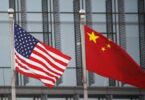Dr. Majid Rafizadeh
China’s pragmatic approach and its major concentration on economic growth will likely continue to contribute to it playing an important role in diplomacy in the Middle East, as well as in enhancing peace, security and stability generally. It is worth noting that one of China’s most valuable imported goods is oil. And the majority of China’s imported oil comes from the Middle East. According to the World’s Top Exports website, the value of crude oil exported to China totaled $229.3 billion in 2021, up 41.4 percent since 2017 and 30 percent from 2020 to 2021.
It added that crude oil is China’s second most valuable imported good after integrated electronic circuits and microassemblies. Forty-four countries supplied crude petroleum oil to mainland China in 2021, including smaller suppliers like Albania, Algeria, Bolivia, Brunei and Ivory Coast. The top five exporters (Saudi Arabia, Russia, Iraq, Oman and Angola) provided 59.6 percent of China’s crude oil imports in 2021. About half originated from nine Middle Eastern nations, ranging from the $39.9 billion-worth provided by Saudi Arabia to the $232.3 million-worth of unprocessed petroleum from Egypt. More fundamentally, China has strong trade and economic relationships with Saudi Arabia and other Middle Eastern countries beyond its oil imports. When it comes to Iran and Saudi Arabia, according to Deutsche Welle, China “has cultivated strong economic and political ties with both Riyadh and Tehran in recent years. Saudi Arabia is China’s largest oil supplier, with trade between the two countries amounting to $87 billion in 2021. Commerce between Iran and China, meanwhile, was worth more than $16 billion in the same year, with Tehran depending on the Asian giant for as much as 30 percent of its foreign trade.”
In other words, the more the Middle East enjoys stability, security and peace, the more China’s economic interests will be preserved. This is accurate for other countries in the region too. Furthermore, this might be partially why China brokered the important agreement between regional powers Saudi Arabia and Iran. This month’s deal is a key development not only in terms of restoring ties between the Iranian government and Saudi Arabia, but also in reducing tensions and enhancing peace and security in the region. Improved ties between Tehran and Riyadh could have a significant impact on the region’s geopolitical and economic landscapes. If the Iranian government fulfills its duties and commits to this historic deal, the region can witness a brighter future, preserving the economic, political and strategic interests of all parties involved.
The Saudi Arabia-Iran deal is without doubt a diplomatic victory for China and enhances its prestige and legitimacy on the global stage. But it is also important to point out that it is not in China’s economic interest to see conflict in the region or, more importantly, to witness the Iranian government being isolated and experiencing tensions with other countries in the Middle East. This is because Beijing has committed itself to a significant investment in Iran. In 2021, China and the Iranian government signed a 25-year strategic partnership deal, which is now in the early stages of implementation. The agreement states that China will continue to import oil from Iran. According to the Tehran Times: “The Chinese foreign minister approved of his Iranian counterpart’s views expounded in his op-ed published in China’s Global Times. Wang (Yi) said the Iranian foreign minister’s views show the promising horizon in relations between Tehran and Beijing. The top Chinese diplomat underlined his country’s readiness to expand cooperation with Iran in financing, energy, banking and cultural sectors despite the … sanctions.”
China’s investments in Iran over the 25-year term of the deal are expected to total about $400 billion. The agreement also grants Beijing some rights and will help the Islamic Republic increase its oil and gas production. Leaked information reveals that one of the clauses is that, in return for its investment in Iran’s oil, gas and petrochemicals industries, Beijing will be given priority if it wants to bid on any new project in Iran that is linked to these sectors. As a result, it is realistic to argue that, if the Iranian government is involved in long-term rivalry or conflict with other countries in the region, this could jeopardize China’s investments in Tehran.
Therefore, Beijing offered the Iranian government an invaluable opportunity for the de-escalation of these tensions via diplomacy, allowing it to embrace friendship with Saudi Arabia. In a nutshell, as China increases its economic engagement in the Middle East, it will most likely step up its diplomatic engagement in the region too. The Saudi Arabia-Iran deal is the first prominent example of this.







